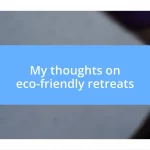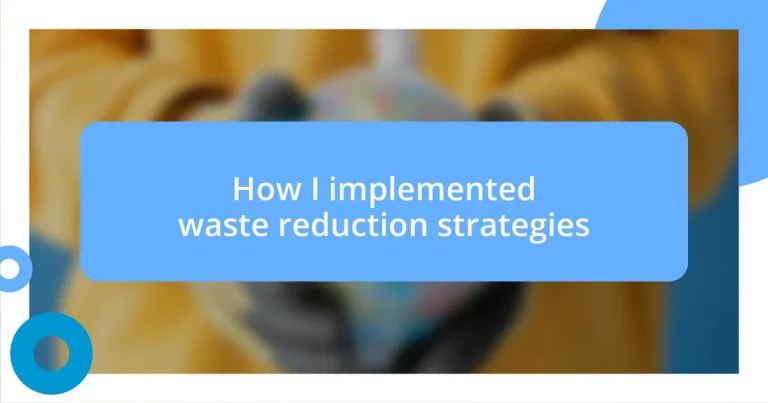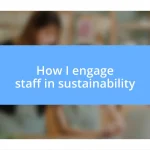Key takeaways:
- Implementing waste reduction strategies requires a shift in consumption habits and a commitment to re-evaluating personal waste management practices.
- Setting achievable waste reduction goals through gradual changes and tracking progress promotes accountability and motivation.
- Sharing success stories and involving others in waste reduction efforts fosters community engagement and encourages innovative practices.
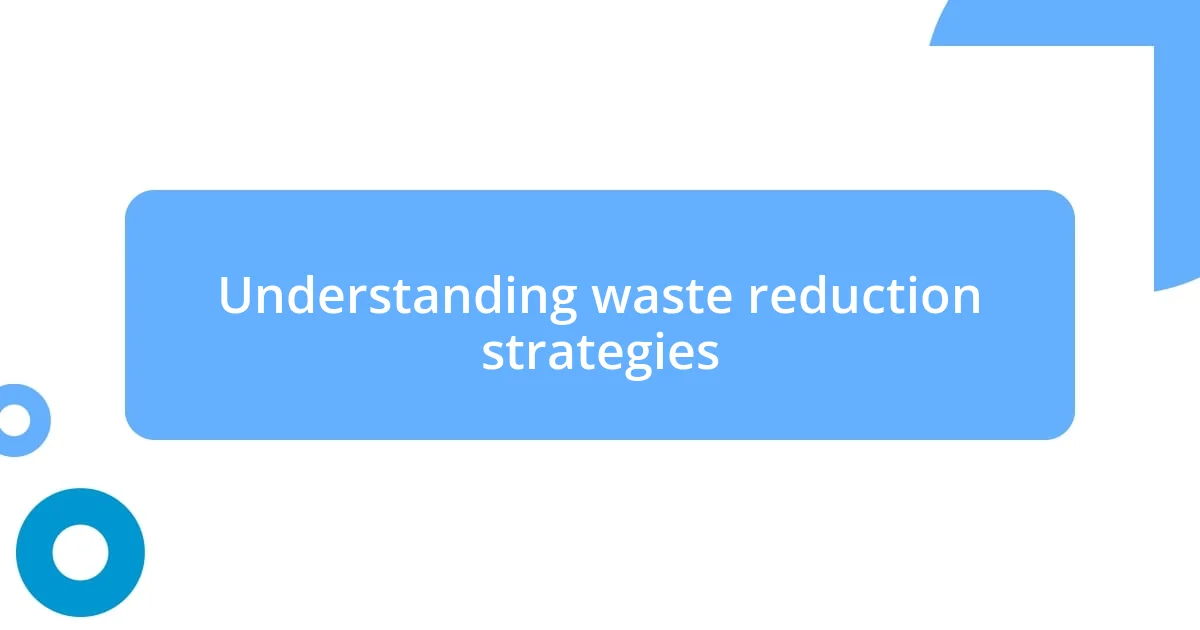
Understanding waste reduction strategies
Understanding waste reduction strategies goes beyond simply minimizing trash; it involves a fundamental shift in how we perceive our consumption habits. I remember the first time I realized how much waste I generated daily—it was shocking! That moment prompted me to explore innovative waste reduction strategies that could not only benefit the environment but also enhance my quality of life.
Often, I’ve encountered the dilemma of choosing convenience over sustainability. Have you ever wondered how many items you could reclaim by implementing smarter consumption practices? For instance, switching to reusable bags and containers has not only cut down on plastic use in my home but has also sparked conversations with friends about the importance of mindful purchasing.
One effective approach I employed was the “reduce, reuse, recycle” mantra. Each step enhances our ability to manage waste effectively. By routinely evaluating what I buy, I’ve cultivated a habit of prioritizing products with minimal packaging and those that serve multiple purposes. This practice has led to a profound realization: waste reduction isn’t just a task, but a lifestyle change that brings both joy and a sense of responsibility.
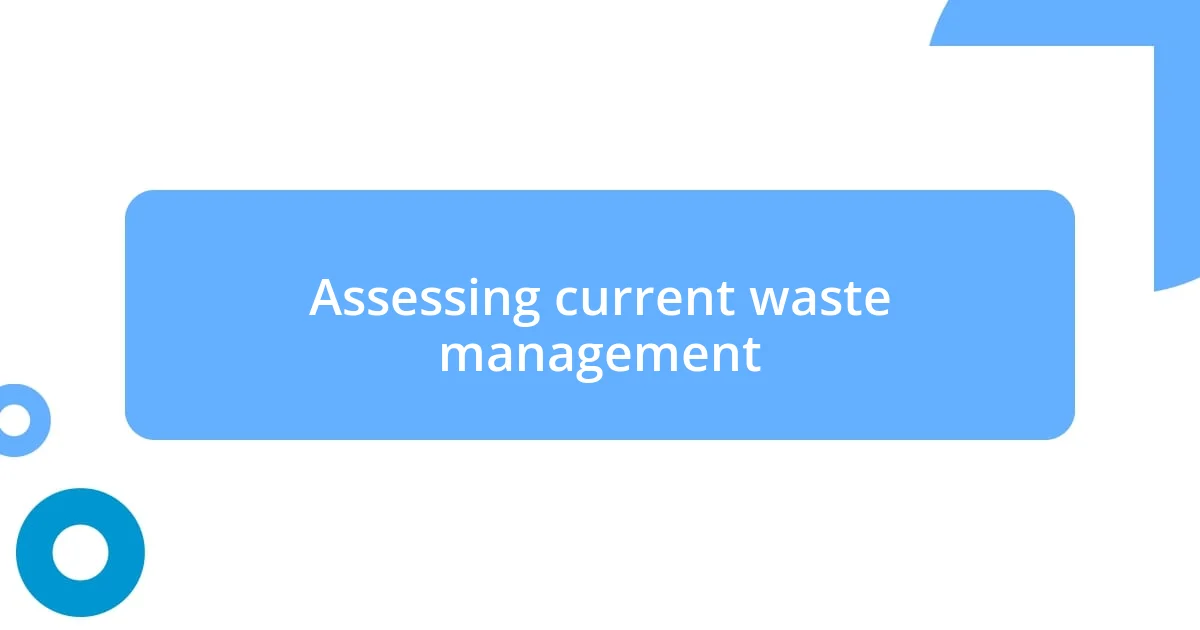
Assessing current waste management
Assessing current waste management practices is essential to understand where improvements can be made. I recall surveying my home and being astounded by the sheer volume of recycling, compost, and trash bins. This prompted a deep dive into how effectively my household managed waste. For instance, I learned that while I diligently separated recyclables, I wasn’t fully aware of my food waste and its impact on overall waste management.
During my assessments, I discovered the concept of the waste audit, which involves tracking the types and quantities of waste produced. Implementing this in my routine opened my eyes to the hidden waste streams in my daily life. I was surprised at how simple changes, like meal planning, dramatically reduced food scraps. This personal experience highlighted that most of the waste was avoidable with a little foresight.
To better compare different waste management strategies and their efficiencies, consider the following table that summarizes key areas of focus:
| Waste Management Strategy | Effectiveness |
|---|---|
| Recycling | Moderately effective; varies by material |
| Composting | Highly effective; reduces landfill waste |
| Waste Auditing | Very effective; identifies waste sources |
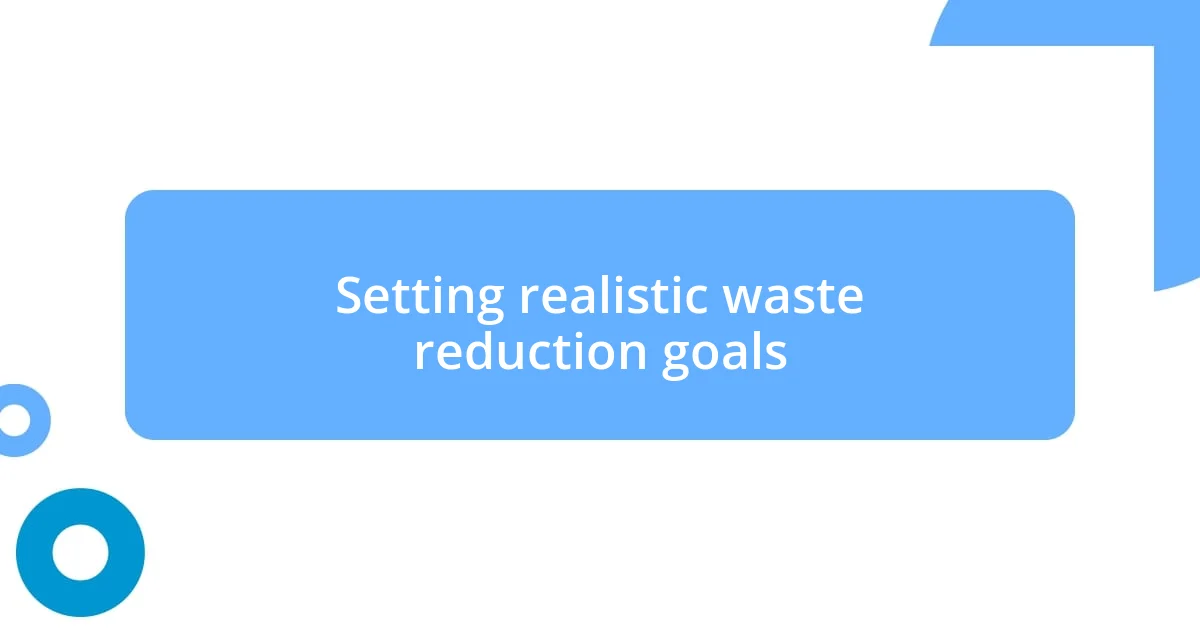
Setting realistic waste reduction goals
When it comes to setting realistic waste reduction goals, I’ve found that approaching it with a mindset of gradual change is key. I remember setting out with ambitious plans to cut my household waste in half within a month. Unsurprisingly, this didn’t stick, and I felt overwhelmed. It was only after stepping back and breaking my goals into smaller, manageable steps that I began to see real progress.
To keep your waste reduction goals achievable, consider these points:
- Start Small: Begin with one area of your life, like reducing plastic waste, and gradually expand to other areas.
- Set Specific Targets: Instead of simply aiming to ‘reduce waste,’ set specific targets, such as “I will recycle 90% of my plastic by the end of the month.”
- Track Your Progress: I’ve kept a simple journal to track my waste reduction efforts. Not only does this hold me accountable, but it also reveals the positive changes over time.
- Be Flexible: Life can be unpredictable. If I miss a goal, rather than feeling defeated, I remind myself that progress is still progress, no matter how small.
- Celebrate Wins: Recognizing small victories in my waste reduction journey has kept me motivated. Whether it’s reusing a container or successfully composting, every little win counts!
By aligning these strategies with my emotional connection to sustainability, I’ve turned the process into something rewarding rather than daunting. Setting realistic goals made the journey not just manageable but truly fulfilling.
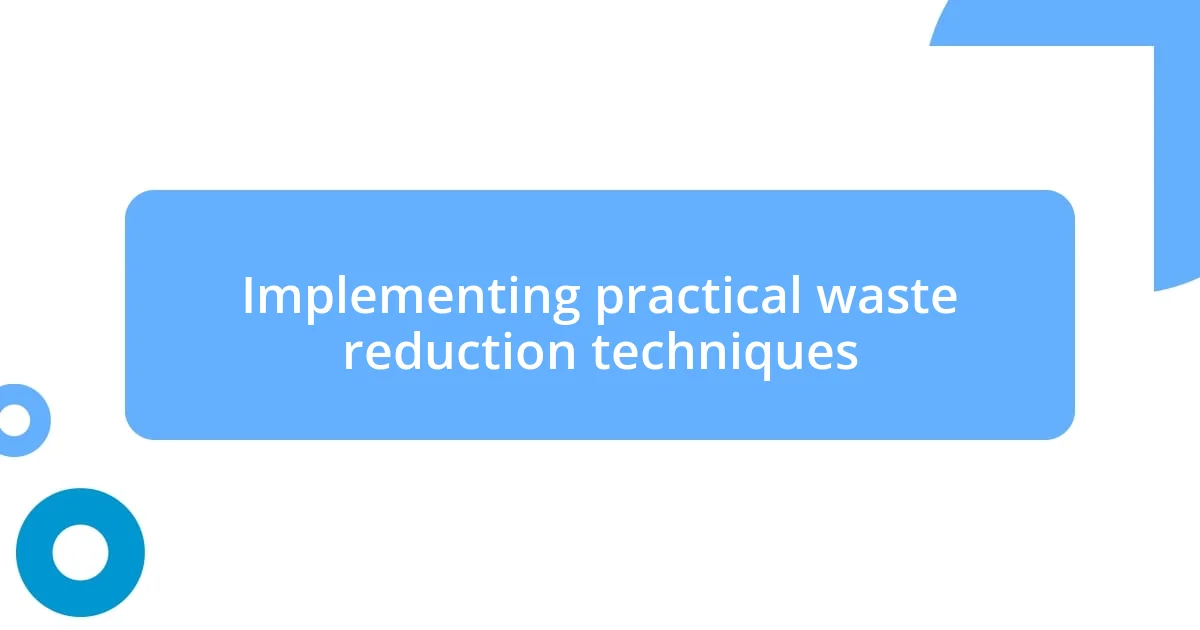
Implementing practical waste reduction techniques
When implementing practical waste reduction techniques, I found that one of the simplest yet most effective actions was to adopt reusable items in place of single-use products. I remember switching from paper towels to cloth rags for cleaning— it was a small change that made a significant impact on my waste output. It’s fascinating how little adjustments can ripple out into larger positive changes. What if we all considered the sheer volume of items we throw away that can actually be reused?
Another technique that worked wonders for me was engaging my family in the waste reduction journey. By involving my kids in sorting recyclables and creating a compost bin together, I noticed not only a decrease in our overall waste but also a shift in their mindset towards sustainability. It was rewarding to see them become advocates for the planet, and it made me wonder: could family involvement be the secret ingredient to making waste reduction efforts more effective?
Lastly, I implemented a meal prep strategy, which dramatically reduced food waste in my home. I was shocked at the amount of produce I would let go bad before making this change. By planning meals and using a grocery list, I now buy only what I need and avoid those regretful compost piles. Isn’t it amazing how planning can help us not just save resources but also save money in the long run? It’s been a game changer for me, and I encourage everyone to give it a try.
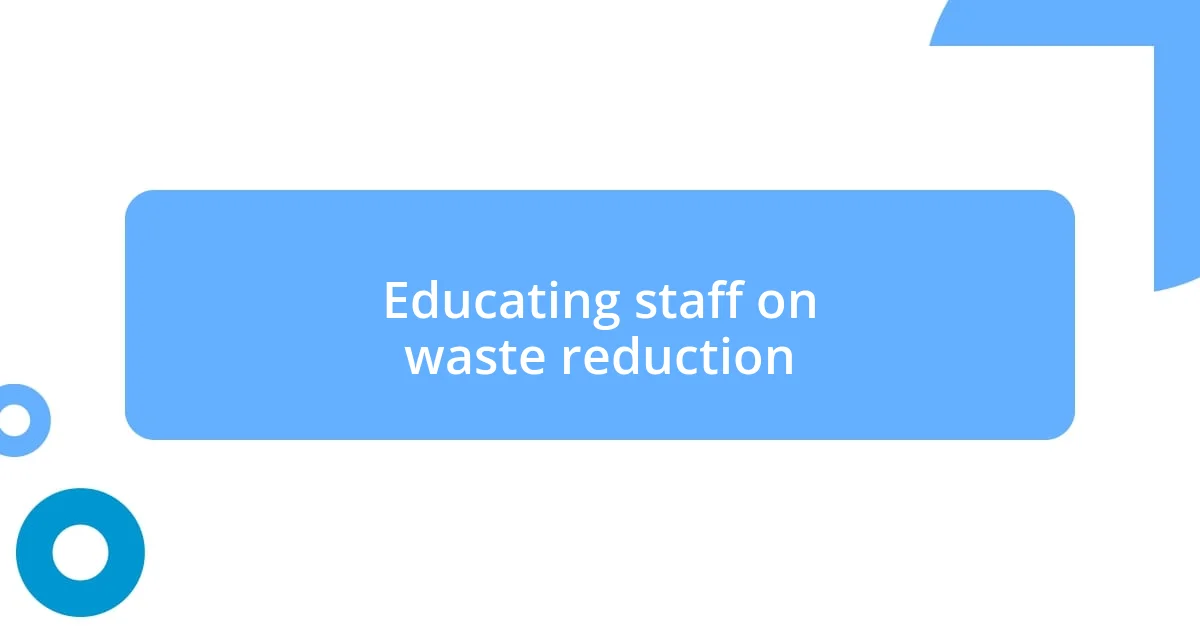
Educating staff on waste reduction
Educating staff on waste reduction is essential for fostering a culture of sustainability. I remember when I first rolled out a waste reduction training session at my workplace. The moment I engaged my colleagues with interactive discussions about the impact of waste, it transformed the atmosphere. It became evident that many were unaware of the simple changes they could make. Isn’t it interesting how a little knowledge can spark a desire for change?
To ensure the training was effective, I incorporated practical examples and hands-on activities. For instance, during one session, we held a waste audit, and I encouraged teams to bring in leftover packaging and materials from their desks. The experience was eye-opening and led to valuable conversations about alternatives and recycling options. I was amazed at how much enthusiasm it generated—people began sharing their own eco-friendly tips, creating a collaborative spirit. Have you ever witnessed how a shared experience can deepen understanding and commitment?
Moreover, I made an effort to keep the lines of communication open after the initial training. I started a monthly newsletter featuring success stories from staff who had implemented waste reduction practices. It was rewarding to see how accountability and recognition fueled ongoing efforts. Really, seeing my peers celebrate their successes felt like we were all in this journey together, making a tangible impact. How can we leverage these stories to inspire even more teammates to join us?
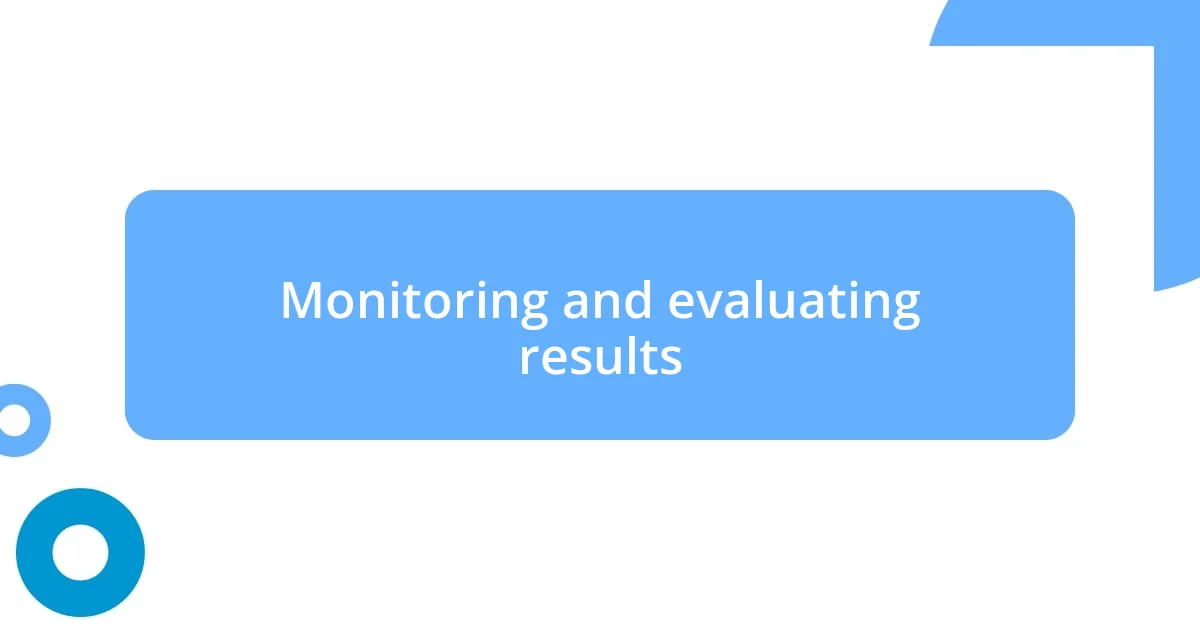
Monitoring and evaluating results
Tracking and analyzing the results of my waste reduction efforts has been a fascinating journey. I initially set up a simple spreadsheet to document our waste output monthly. Each time I saw a downward trend, my excitement grew. It’s surprising how visualizing numbers can turn an abstract goal into a tangible achievement. Have you ever found that seeing progress in black and white inspires you to push even harder?
Reflecting back on the data, I noticed a significant drop in food waste, which made my heart swell with pride. I even shared this with my family during our weekly dinner discussions, sparking a sense of collective achievement. It was a small moment, really, but the joy in their eyes as they learned about our progress was priceless. Isn’t it encouraging to see everyone rallying around a common goal?
I also experimented with regular feedback sessions, where I’d gather insights from my family about what worked and what didn’t. This approach provided valuable perspectives I hadn’t considered. One evening, my children suggested substituting plastic bags with reusable ones during our grocery trips. I was pleasantly surprised by their input; it reminded me that even the youngest voices can offer impactful solutions. What steps can you take to include others in evaluating and refining your waste reduction strategies?
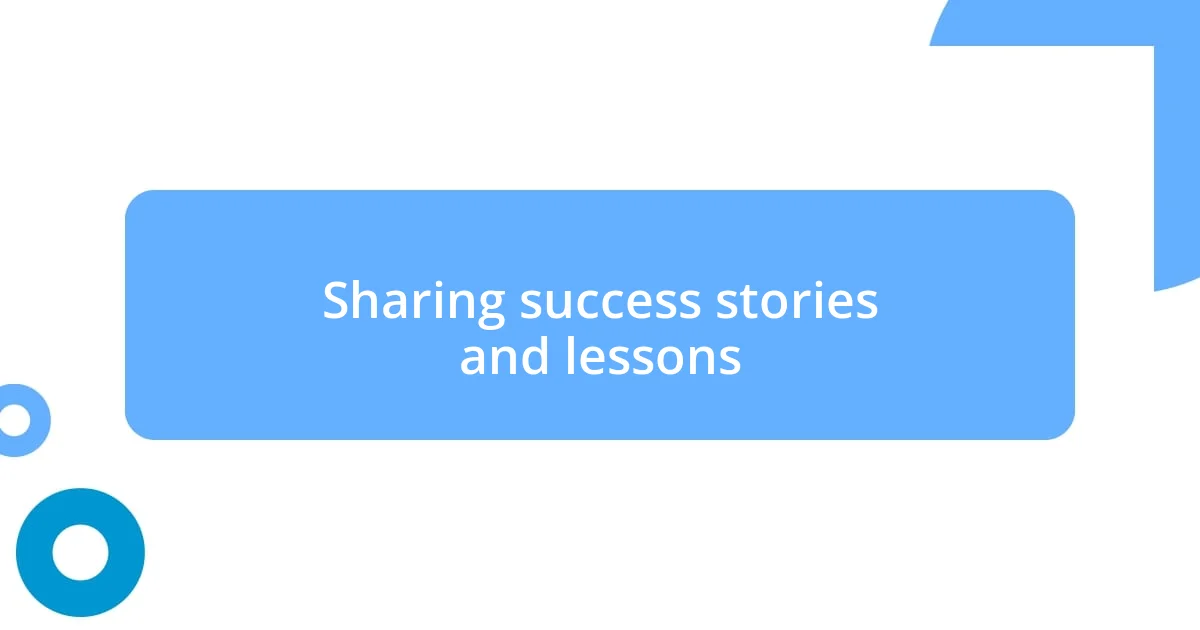
Sharing success stories and lessons
Sharing success stories has been a cornerstone of our waste reduction initiative. I vividly recall a colleague who decided to host a zero-waste lunch in our break room. She challenged everyone to bring meals in reusable containers, and the result was a wonderfully diverse spread—each dish was vibrant and reflected personal creativity. Seeing the collective effort not only made for a delicious meal but also sparked conversations about sustainable practices that we otherwise might not have had. Have you ever noticed how a shared experience can build connections among people?
I learned that even small victories are worth highlighting. For example, one team took it upon themselves to redesign our meeting materials digitally, leading to a 50% reduction in paper usage during presentations. When they shared their success in the office newsletter, it was contagious! Others began exploring similar changes, igniting a ripple effect. Seeing team members embrace these practices with pride made me realize the power of recognition. Don’t you think celebrating even minor achievements fuels motivation?
The lessons we’ve gathered form a rich tapestry of insights. A particularly memorable takeaway came from a brainstorming session where one team member suggested involving local businesses in our waste reduction efforts. That collaboration not only expanded our resources but also brought in expertise from outside our organization. Reflecting on that, it’s clear that success stories provide a foundation for innovation. I wonder how many remarkable ideas are waiting to be discovered when we encourage dialogue and share our experiences.



